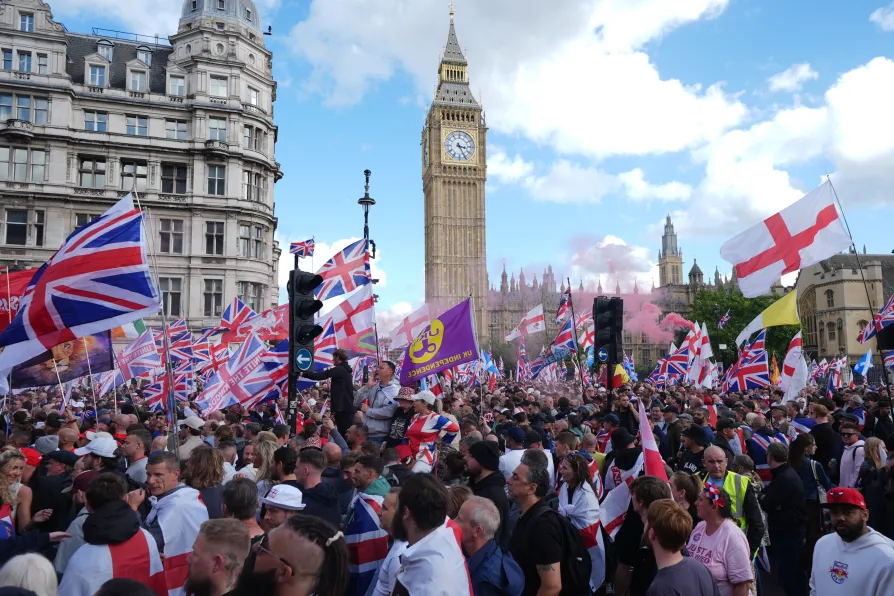Error message
An error occurred while searching, try again later.
 People taking part in a Tommy Robinson-led Unite the Kingdom march and rally in Parliament Square, central London, September 13, 2025
People taking part in a Tommy Robinson-led Unite the Kingdom march and rally in Parliament Square, central London, September 13, 2025
SATURDAY’S divisive “unite the kingdom” demonstration — fronted by grotesques like Stephen Yaxley-Lennon and Elon Musk and brought about by a combination of mass-media promotion and the networks of far-right and fascist figures behind the flag-raising campaign — is a further demonstration that the post-war political culture that allowed for the routine alternation in government between the two-and-a-half parties of class compromise is coming to an end.
This was a disturbingly large mass event. The police estimate that 110,000 people attended appears to be an accurate assessment, although 12 hours later, the BBC has inflated it to 150,000. This is a contrast with the long-established tradition of underreporting attendance at progressive manifestations.
Where the BBC will manage to miss a mass Palestine solidarity rally assembling outside Broadcasting House, it managed to both anticipate and report this demonstration with impeccable attention to detail and nuance. Murdoch’s media and the expatriate billionaire press generally took the same approach.
There is a tendency by some on the left to understand Reform UK and its symbiotic relationship with the reviving networks of the fascist far right as a flash in the pan.
It is much more than that. There were elements on the right who simply wanted a rerun of last year’s riots, but a more strategic tendency saw in the Operation Raise the Colours campaign a mechanism to create a broader base for their poisonous politics. In this, they have proved partially successful.
This is a street movement with powerful tendencies that will pull it further to the right than Reform UK if left unchecked at the street and community level.
Because Keir Starmer’s language and political positioning on immigration have given the far right’s chosen issues a boost, the left needs to up its game to challenge the myths and mystifications that so distort the public discourse around migration, but it would be a mistake to think this was just about migration.
The far-right appeal follows tradition in feeding off the full range of ways in which capitalism’s crisis degrades the lives of working people. To the full extent to which Labour in government is part of the problem, and to the extent that no credible alternative mass electoral vehicle yet exists, the first way to deal with these problems is in the community, in the localities and workplaces.
The existing organisational frameworks for mobilising anti-racists must break out of a certain routinism, become more innovative, especially at the local level and draw in to leadership and organisation wider political forces and especially trade unionists with authority and reach.
But challenging the far right is not simply an anti-racist exercise, and simply labelling it as such is a barrier to understanding and effective action.
At a rough count, the weekend demonstration represents about 150 people per parliamentary constituency, although it is clear that the enterprise appeals largely to an English sensibility and has a greater reach in some areas than others.
Measure this simply against the expressions of support for the new left party — getting on for 10 times this number — and we can see the potential for a political intervention at the local level.
Already, people are taking initiatives to give this new formation some organisational heft in the localities, but long before it can become an electoral vehicle, it needs to be a presence in every working-class locality dealing with the real-life questions which animate working people and organising around the issues which concern them and in a language which resonates.
To the labour movement and the political left, a great responsibility devolves: to find the unity and organisation to make the working class the decisive force in politics and life.










